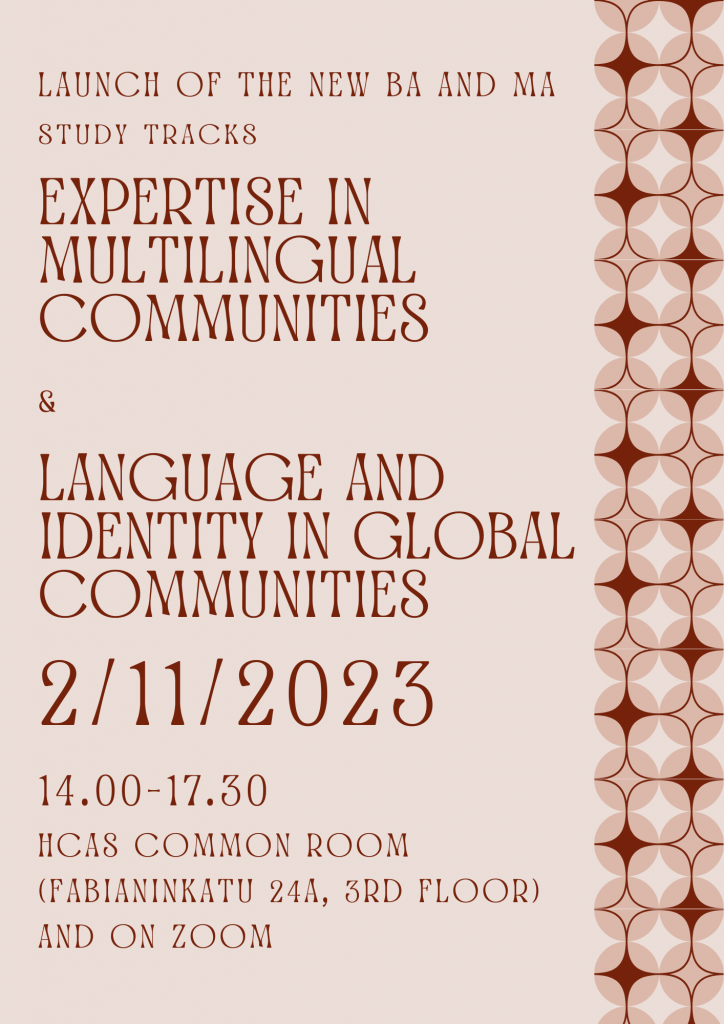Registration link
Zoom-link
Time: November 2, 2023, 14:00–17:30, followed by a drinks reception
Location: HCAS Common Room (Fabianinkatu 24a, 3rd floor) and on Zoom
Programme
| 14:00-14:10 | Welcome and opening words by Prof. Amanda Hammar (Centre for African Studies, University of Copenhagen and president of AEGIS (African Studies in Europe) |
| 14:10-15:40 | Creolising swirls, transoceanic circuits: creolisation theory and transcultural phenomena in the Indian Ocean World Prof. Ananya Kabir (King’s College London) |
| 15:40-16:00 | Towards teaching, and conducting, non-extractive research Thera Crane (University of Helsinki) |
| 16:00-16:30 | Kahvitauko / Coffee break |
| 16:30-16:50 | Overcoming ideas of Africa as the Other in teaching and research Friederike Lüpke (University of Helsinki) |
| 16:50-17:10 | Uusia tuulia kielenopetukseen? Lotta Aunio (Helsingin yliopisto) |
| 17:10-17:30 | Miksi AMY & KIGY? Liban Ali Hersi, Lotta Aunio, Mikko Autere, Antti Laine, Riikka Tuori, Hany Saber Mansour (Helsingin yliopisto) |
| 17:30-19:00 | Juomatarjoilu / Drinks reception |
The studies of ‘non-Western’ languages and societies emerged as a discipline in colonial Europe at the end of the 19th century. By establishing separate disciplines such as African and Asian languages and linguistics, Arabic, Near and Middle Eastern studies, European Othering processes resulted in maps whose boundaries negated millennia of interaction and entanglement. By establishing Sub-Saharan Africa as a geographic area distinct from North Africa, the Near and Middle East and South Asia, colonial disciplines studied imaginary isolated areas, languages and cultures and impeded a recognition of the linguistic and cultural entanglements in the Atlantic and Indian Ocean spaces and across the Sahara and the longstanding multilingual practices reflecting them.

At this launch event for two new study tracks in the BA and MA programmes in languages, we present the decolonial vision underlying basing our teaching on a phenomenon – multilingualism – rather than on single languages and areas and focussing on entanglements in a trans-oceanic world region rather than in areas viewed as separate. Through doing so, we aim to bring Global South ideas of language and multilingualism to the fore so that they are no longer merely seen through the prism of theories created in the Global North but centrally contribute to the recalibration and enrichment of existing theories of multilingualism. Such epistemological renewal necessitates new research practices and ethics and also includes innovative approaches to language learning and teaching, urgently needed for formal education worldwide.
Today, we invite you to celebrate out new study tracks with us through listening to presentations on decolonial linguistics and on the fluid multilingual practices, multiple identities and drifting connections in Ziwa Kuu, the Swahili Sea, the Afrasian Sea, the Indian Ocean, the Bahari Hindi – an area whose many names reflect its embedding in movement and that is exemplar for dynamic relations between spaces, language and identity everywhere.
